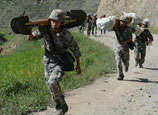
The U.S. is now in discussions with the Philippines over an agreement allowing the extension of military bases and a rotating complement of forces. The agreement will also permit U.S. soldiers to stay longer in the Philippines and station themselves in Philippine military bases.
The Philippines has long maintained close military ties with the U.S. The Philippines relies on U.S. military protection. Two thirds of Philippine military spending is financed from the rental revenues of its military base leased to the U.S. When the Philippines restarted its arms programs, sourcing from the US became its first choice. Many of its second-hand F-16 fighters and retired Hamilton-class cutters were imported from the U.S.
It is therefore clear that the Philippines is determined to do everything it can to facilitate the U.S. “rebalancing”.
Disorient
However, in contrast to the perceived advantages of these maneuvers, reality is somewhat less accommodating. Manila seems to be out of step with its own people.
The negotiations with the U.S. have triggered a lively discussion in the Philippines. More and more people are opposed to the agreement. Many senators are worried that opening military bases will damage their national interests. Much of the media is saying ”no” to military bases, sensitive to national sentiment and the lessons of history. Academics have pointed out the problems that the U.S. military base is likely to cause.
The increasing U.S. military presence is accompanied by much that is neither positive nor beneficial: according to the former head of the Philippine Department of Foreign Affairs (DFA) rubbish is being dumped in the seas over the Philippines, coral reefs are being damaged, and there is the unexplained appearance of U.S. drones in the country’s air space.
The Philippines is at risk of becoming isolated in the international community.
Although the Philippines makes frequent play of its “importance” as a pawn, the U.S. has made it clear that it takes no side in the South China Sea issue. This means that no matter how closely the Philippines stands by the U.S., the latter will not rashly dispatch troops over issues of sovereignty and territory.
Just as its own academics have observed, Manila should not always take its stance from the U.S. The country should develop diplomatic policies that are independent and based primarily on its own long-term interests.
Read the Chinese version: 菲律宾“狐假虎威”瞎折腾, source: People's Daily Overseas Edition, author: Zhang Hong

















 China builds 'world's tallest building'
China builds 'world's tallest building'


![]()
